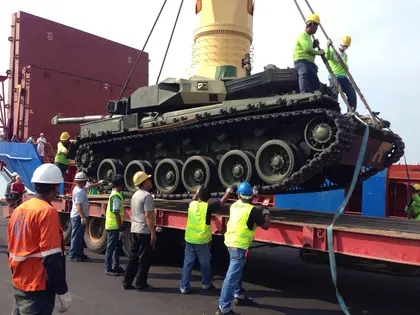“Every day I am receiving a couple of phone calls that they’re ready to ship load to meet contracts,” Tereshchenko told the Kyiv Post. “But as a patriot, I will not ship anything that can fly, shoot or drive in our direction. And no economic arguments can change this.”
He says all Russian contracts are being audited at the moment, and the audit will enable to take a decision on what to do with some types of contracts – for example, those were Ukrainian components are used for third party contracts signed with Russia, or the contracts under which civilian goods produced by Ukroboronprom are shipped to Russia.
JOIN US ON TELEGRAM
Follow our coverage of the war on the @Kyivpost_official.
Russian contracts are key for the survival of Ukraine’s arms monopoly – a concern of 130 companies that employ some 120,000 people, says Tereshchenko. Russia and third world countries that cannot afford more technologically advanced (and expensive) western-made weapons are Ukraine’s main clients.

Tereshchenko says the shipments to Russia that have been halted are worth “hundreds of millions” hryvnias.
“This is an issue of economic security. It means hungry families, and their financial troubles are a component (of it),” says Tereshchenko.
He says Ukraine can partially compensate for the loss of Russia as a client by intensifying trade with countries like China and India, which are a part of the traditional market for Ukraine’s weapons, but finding new clients is a long process.
There are some types of weapons that Russia cannot make without Ukraine’s components. Among them are aviation radars and beam holders for some types of missiles. “This is a long list, not one, two or three items,” says Tereshchenko.
He says that overall, the shipment of “hundreds of components” has been halted. But Russia is already talking about replacing the Ukrainian components, and Russian President Vladimir Putin presided over a meeting of military industry officials on import replacement policy in the arms sector on April 10.
Vladislav Masalov, head of United Engine Building Corporation, said on Apr. 15 that the government is already financing the construction of testing facility for marine gas turbine engines and other types of engines which Russia has traditionally purchased and serviced from Ukraine.
He said that cutting dependency on Ukraine “would not take terms of tens of years, but a short period of time,” Masalov was quoted by Interfax news agency as saying.
In the meantime, Russia is reciprocating some of the measures, holding supplies of components needed by Ukraine. “There are many goods that stand at the border, but they (the shippers) are not being given an order to cross,” says Tereshchenko.
From the joint Soviet past, Ukraine inherited some plants that complete the production cycle for Russia’s strategic military enterprises. Some of them, like Zaryamashproekt, which produces turbines in Mykolaiv regions, are located in southern Ukraine.
Some experts have expressed fear that Russia is more likely to invade the region to seize such companies that allow it to strengthen its arms production business, but Tereshchenko brushed off these fears. “I don’t think it increases the chances (for attack),” he says.
Moreover, the state arms monopoly has 13 companies in Crimea, which has been annexed by the Russian Federation last month. But despite the economic uncertainty in the region, the companies still report to the headquarters in Kyiv.
Tereshchenko says he believes that they will continue to work in the current legal status, and fulfill contracts received from the mother company. He said these companies had enough business commissioned to keep them going for a year. But he also admits that the situation in Crimea changes every day. “I can only sympathize those companies that ended up in these circumstances,” he says.
Regardless of what happens in Crimea, the concern is long overdue for restructuring. Tereshchenko says he found it disheveled, inefficient and robbed by the previous management through financial schemes that allowed them to pocket the company’s profits. Last year, Ukroboronprom had sales of Hr 14.7 billion and made a profit of Hr 475 million.
“Some of those people have gone to Russia, others are remain in Ukraine,” he says. Tereshchenko adds that investigations are a long time in coming, since the audit of the company is ongoing and nothing that would document those violations has yet been passed on to the prosecutor’s office for investigations.
In the meantime, the concern itself needs to become leaner and aim to develop promising, closed-cycle productions that would open new markets for Ukraine. “New products means new markets. Old products means old markets,” Tereshchenko said.
Moreover, many of the new potential products can be used by Ukraine’s own armed forces that need modern equipment badly.
Tereshchenko says Ukroboronprom is capable of designing a light helicopter in the foreseeable future if it invests at least some of its profits into research. Ukraine could use between 200-400 of such helicopters.
A new pilot-free flying machines are another option. “A few million hryvnias would be enough to finish off what we have, to teach our developments to fly,” Tereshchenko says. “But unfortunately, everything that smelled of creativity was previously rejected.”
As a result, the concern will take “tens of years” to catch up with Western standards and rely on traditional sales markets in the meantime.
Kyiv Post deputy chief editor Katya Gorchinskaya can be reached at [email protected]
You can also highlight the text and press Ctrl + Enter




